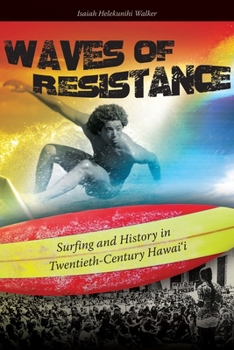Waves of Resistance: Surfing and History in Twentieth-Century Hawai'i
Select Format
Select Condition 
Book Overview
Surfing has been a significant sport and cultural practice in Hawai'i for more than 1,500 years. In the last century, facing increased marginalization on land, many Native Hawaiians have found refuge, autonomy, and identity in the waves. In Waves of Resistance Isaiah Walker argues that throughout the twentieth century Hawaiian surfers have successfully resisted colonial encroachment in the po'ina nalu (surf zone). The struggle against foreign domination of the waves goes back to the early 1900s, shortly after the overthrow of the Hawaiian kingdom, when proponents of this political seizure helped establish the Outrigger Canoe Club--a haoles (whites)-only surfing organization in Waikiki. A group of Hawaiian surfers, led by Duke Kahanamoku, united under Hui Nalu to compete openly against their Outrigger rivals and established their authority in the surf.
Drawing from Hawaiian language newspapers and oral history interviews, Walker's history of the struggle for the po'ina nalu revises previous surf history accounts and unveils the relationship between surfing and colonialism in Hawai'i. This work begins with a brief look at surfing in ancient Hawai'i before moving on to chapters detailing Hui Nalu and other Waikiki surfers of the early twentieth century (including Prince Jonah Kuhio), the 1960s radical antidevelopment group Save Our Surf, professional Hawaiian surfers like Eddie Aikau, whose success helped inspire a newfound pride in Hawaiian cultural identity, and finally the North Shore's Hui O He'e Nalu, formed in 1976 in response to the burgeoning professional surfing industry that threatened to exclude local surfers from their own beaches. Walker also examines how Hawaiian surfers have been empowered by their defiance of haole ideas of how Hawaiian males should behave. For example, Hui Nalu surfers successfully combated annexationists, married white women, ran lucrative businesses, and dictated what non-Hawaiians could and could not do in their surf--even as the popular, tourist-driven media portrayed Hawaiian men as harmless and effeminate. Decades later, the media were labeling Hawaiian surfers as violent extremists who terrorized haole surfers on the North Shore. Yet Hawaiians contested, rewrote, or creatively negotiated with these stereotypes in the waves. The po'ina nalu became a place where resistance proved historically meaningful and where colonial hierarchies and categories could be transposed.




